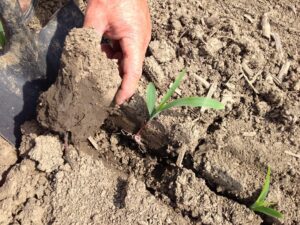This is our third and final installment of a 3-part series to familiarize you with the common corn seedling diseases you may encounter this spring. Part 1 was a discussion of conditions that promote disease prominence in US fields. Part 2 described what those particular common pests were. Now let’s wrap up with ideas to help you fight back. Stay tuned for the next series about soybeans!
Content by Mark Jeschke, Ph.D., Agronomy Manager, Corteva Agriscience
Managing corn seedling diseases begins with an effective fungicide seed treatment package. Additionally, growers can help to minimize the effects of seedling diseases by avoiding planting when soil temperatures are likely to remain low for an extended period of time. Management practices that minimize soil compaction, crusting, dense crop residue over the row, herbicide injury, or fertilizer injury will help maintain seedling health and reduce susceptibility to soilborne pathogens.
Seed Treatments
Like all pesticides, seed-applied fungicides break down in the soil. Applied at label rates, these products can provide protection against seedling diseases for six weeks after planting. The benefits of this early protection can extend all season though, as the establishment of a strong and healthy root system can make the plant better able to fend off pathogens later in the season.
Insecticide seed treatments have no direct activity against diseases but may contribute to disease control in a secondary way. By reducing insect feeding on roots and plants, insecticide seed treatments reduce the points of entry into the seedling by pathogenic fungi. See what AgVenture brand seed treatments are available for corn.
Soil Temperature at Planting
Most soil-borne pathogens are ineffective against a treated corn seed and a healthy, growing corn seedling. But at soil temperatures below 55°F (13°C), corn germination and emergence require three weeks or more.

A compacted seed furrow contributes to emergence struggles which can lead to more disease issues and other season-long problems.
During this time in the soil, the corn seed and seedling are vulnerable to a myriad of stresses that can weaken the plant and increase its susceptibility to seedling diseases that often thrive in cool, wet conditions. Primary stresses include excessive herbicide uptake, fertilizer burn, and insect feeding.
Growers should begin their corn planting in fields with lighter soils, good drainage, and minimum residue over the row. In heavy-textured, low-lying, or high-residue fields, especially those with a history of seedling diseases, early planting in cold soils is not recommended. Generally, growers should wait until soil temperatures rise above 50°F (10°C) and are likely to remain there before planting corn in those fields.
A seedbed that is well-drained with little or no crop residue over the row will reduce the risk of corn seedling diseases. Compaction, crusting and dense residue in the row are barriers to seedling emergence and are often a primary contributor to seedling disease development.
This ends our 3-part series on early season corn diseases. Next up will be a similar peek into early season pests of soybeans!